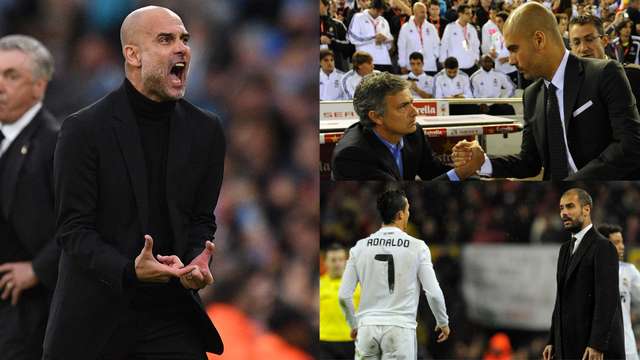Even when he is not thinking about football, Julian Nagelsmann is thinking about football.
He takes a pen and paper with him to the bathroom in the morning just in case a 'eureka' moment occurs and he needs to note it down to use in training later that day.
He wants his players to think about football too.
Before training sessions, he often gets his squad to write down what the lesson will be about and encourages them to look for ways they can improve.
"I often deliberately overwhelm my players," he told FAZ in 2016 after being appointed the Bundesliga's youngest-ever head coach at Hoffenheim.
"If I give them 10 things a day and they learn four of them, I'm happier than if I stick to the learning theory where the goal is a maximum of five things per day and then they only remember two."
Nagelsmann's approach is a combination of coaching and motivation, which he suggests is 35-40 per cent tactics and 60-65% leadership.
The social aspect of managing a football team is crucial for him, especially as when he was first appointed, he entered a dressing room where many of the players he was coaching were older than him.
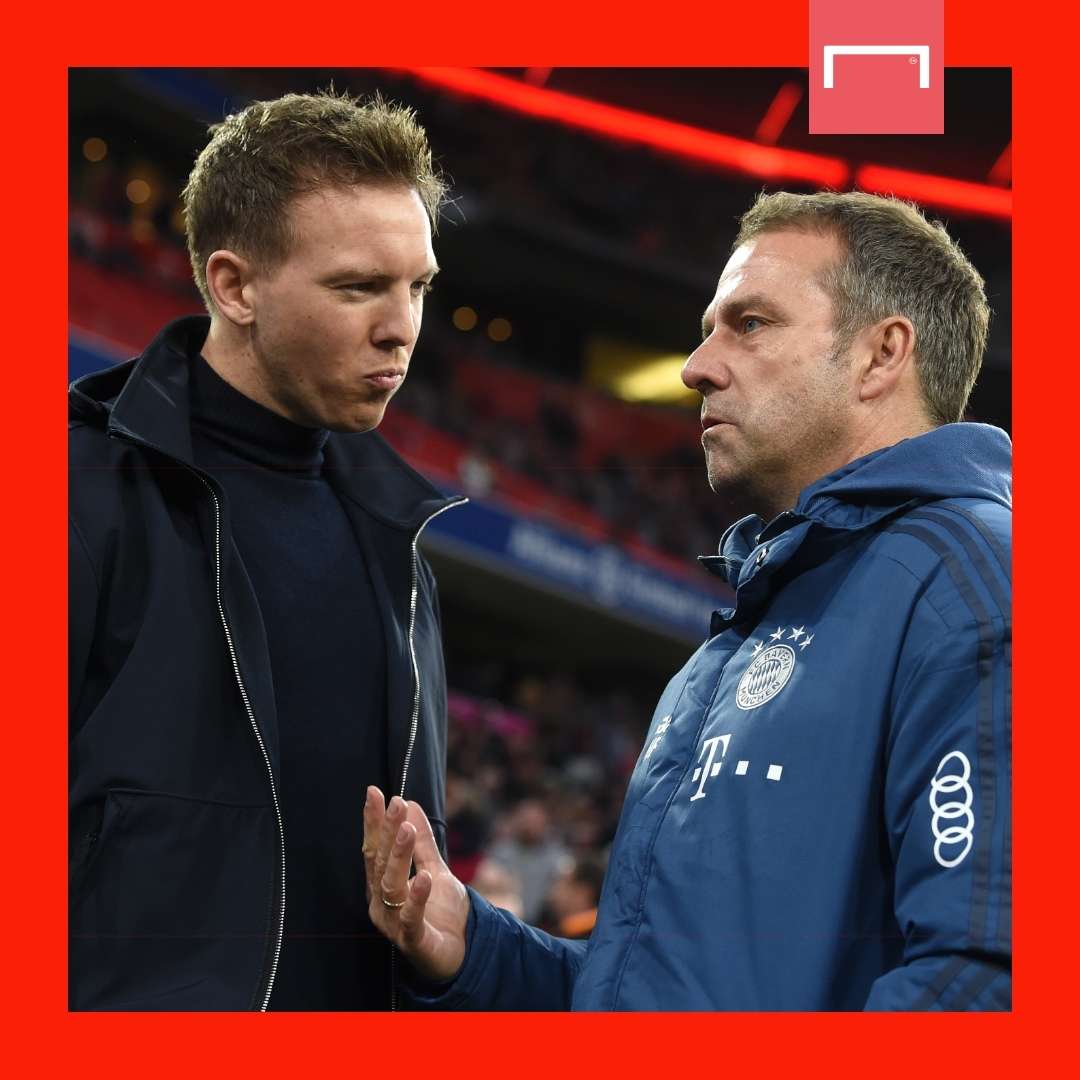 Getty Images
Getty Images
Handed the job at just 28 by a village club bankrolled by a billionaire, the media claimed Nagelsmann's appointment was merely a PR stunt, giving him nicknames like 'Trainer-Bubi': the little boy coach who was out of his depth.
Five years on, and with Bayern Munich having agreed to pay up to a record-breaking €25 million (£22m/$30m) to make him their new manager, the jokes have long since stopped.
After being appointed at Hoffenheim, with the team sitting second to last in the Bundesliga, Nagelsmann brought about a sea change to a struggling side by telling his players to stay out of tackles and look to win the ball back by a combination of pressing and cutting off passing lanes.
He felt that poor tackles would not only lead to fouls, but leave players exposed so that when they did win the ball back, they could not counter as quickly or effectively.
This is something he instilled on the training ground, staying away from specific patterns as he felt that sort of over-coaching would not produce results.
"I don't think much of automatisms, because they assume that a situation is always the same, otherwise the process no longer works," he told FAZ.
"But that doesn't fit the reality with 22 players on the pitch. If the opponent is only half a metre to the left, the player suddenly doesn't know what he has to do.
"I therefore prefer to work with principles that I assign to the respective situations. Most of them are relatively simple. They always apply to me, in every training session, in every game, completely independent of the opponent or the geometric arrangement of the players on the field. The principles of counterattacking, for example."
Results were immediate at Hoffenheim, as they won seven of their remaining 14 league games to avoid relegation from the Bundesliga.
"I will never forget how Kevin Volland came to me with shining eyes after Julian's very first session and said: 'We'll stay in the league!'," Lutz Pfannenstiel, Hoffenheim's head of international relations and scouting at the time, told DAZN.
"Julian had managed in the shortest possible time to get the players behind them and create a shockwave that went through the team. It was like a snowball. Within minutes, the first player was infected, then the next, and after a few hours, the last. Julian is a human catcher."
The following season, the 2016-17 campaign, continued in a similar manner, with Hoffenheim performing above expectations to qualify for the Champions League for the first time in their history.
Nagelsmann's leadership was crucial to their success, but his tactical nous also came to the fore.
Hoffenheim was the perfect fit, as owner Dietmar Hopp made his money in computing and was more than open to Nagelsmann's desire for more technology to help the team.
Hopp helped fund the Footbonaut, a specially-designed robotic cage where balls are fired at a player in the middle of the room and they have to pass it back quickly to one of 72 highlighted panels.
When Nagelsmann arrived, he also had the Videowall installed beside the training pitch, so players could watch highlights and clips to help with their understanding of the coach's aims and their own strengths and weaknesses.
After being forced to retire from playing at just 20, Nagelsmann earned a degree in sports science and worked as a scout under Thomas Tuchel, his boss at Augsburg.
He then spent time as a youth coach at 1860 Munich, where he had played as a defender when he was a teenager, before moving to Hoffenheim in 2010.
Success with their underage teams, including a cup title with the Under-19 side, saw Bayern approach him to join their coaching staff for the first time.
However, seeing better chance of progress in his current club, Nagelsmann turned down the team he had supported as a boy, and the gamble quickly paid off as he was promoted to the senior squad dugout.
His rapid ascent at Hoffenheim meant that other teams would naturally come calling, and it was no surprise when RB Leipzig appointed him in the summer of 2019.
Leipzig had been a top-four team before Nagelsmann took over, but he pushed them on to even greater heights.
As had happened at Hoffenheim, players upped their performances under the youthful tactician, with Timo Werner challenging Robert Lewandowski for the top scorer crown and earning Leipzig a 400 per cent return on their investment when they sold him to Chelsea.
Werner has not been as prolific in west London, with his drop in form part of a pattern among players when they leave to play under a coach other than Nagelsmann.
"One trait that makes Julian so special is the fact that he makes every player better," Pfannenstiel says. "Many coaches can improve young talents, but to improve experienced players is something very, very rare."
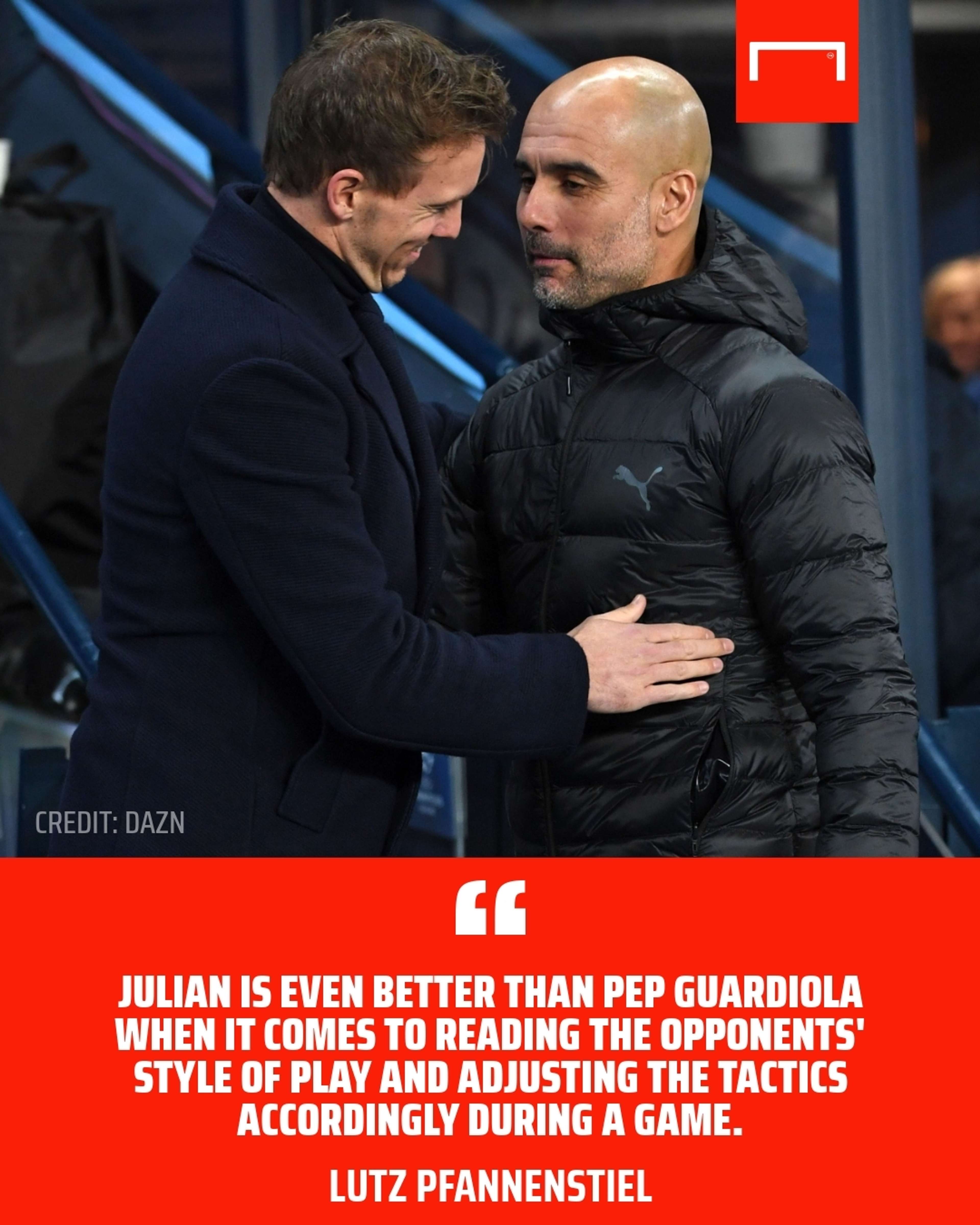 Goal
Goal
Kevin Kampl is one such player who improved under Nagelsmann, starting in the Champions League semi-final for Leipzig against Paris Saint-Germain in 2020.
The midfielder knew that his coach was destined for more, even after turning the Red Bulls into genuine contenders in Germany and Europe.
"I've never seen a coach who is so involved in football and has so much expertise at that age - that's unbelievable and I think it's unique in world football at the moment," Kampl told Goal.
"You always think he's been there for 20 years. He knows how to prepare the team perfectly for the games, always has good match plans. Leipzig will not be the last step, he has a great coaching career ahead of him."
Still only 33, Nagelsmann is taking that next step with Bayern, who have given him a five-year contract in the belief that he can be the Bavarians' new Pep Guardiola - a manager the new boss of the Bundesliga champions has been inspired by.
“I would call myself a good manager,” Nagelsmann told DAZN and Goal. “For me, being a top coach means more than just teaching football.
"That includes empathy, it means that you can speak to a group, that you can deal with the media - you have to be able to do all of that. I would not describe myself as blind in this regard, but a top coach also includes titles.
“And I don't have that to show yet!"
Those trophies will come at Bayern, with Pfannenstiel even believing that Nagelsmann is already tactically better than Guardiola.
"Julian is even better than Pep Guardiola when it comes to reading the opponents' style of play and adjusting the tactics accordingly during a game," he claims.
“Pep is someone who analyses a lot and then makes a decision. With Julian, the analysis runs parallel to the observation. We're talking about a very small window of time, but it can be crucial.
“Incidentally, this is not a talent, but a gift. I've met a lot of coaches, but Julian has this quality exclusively. It is unique.”
Guardiola won three league titles and two DFB-Pokals with Bayern, but ultimately fell short in the Champions League.
Nagelsmann is hoping to do even better. Now that he has put his future in writing, he can get started.
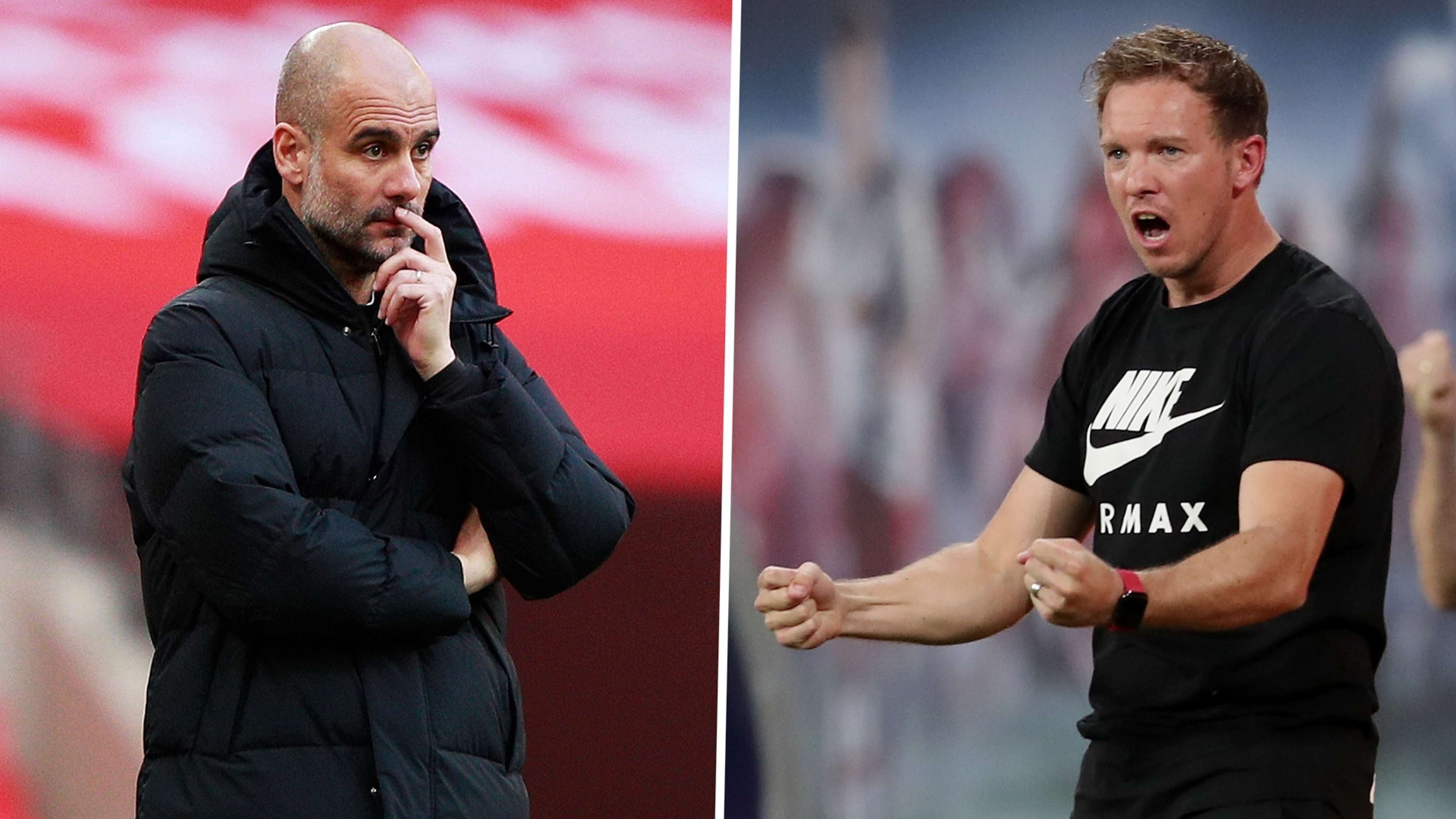




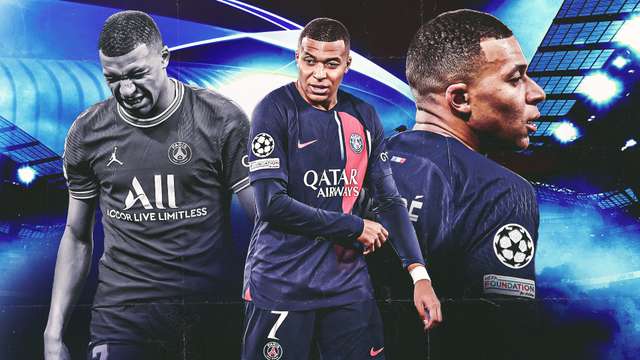
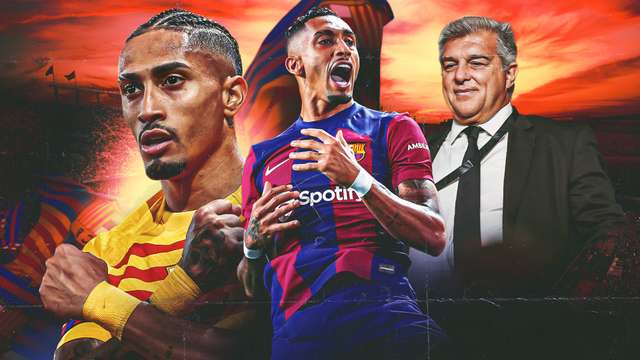
.jpg?auto=webp&format=pjpg&width=640&quality=60)
